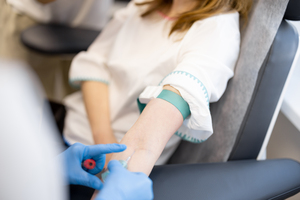Key points
- Pregnancy can intensify allergy symptoms, but it's generally not dangerous to the baby.
- It's crucial to consult with healthcare providers before starting any allergy treatments during pregnancy.
- Some over-the-counter allergy medications are considered safe during pregnancy, including certain nasal steroid sprays and antihistamines.
- Home remedies like avoiding allergens, using humidifiers, and nasal irrigation can also help alleviate allergy symptoms during pregnancy.
- Pregnant women with severe allergy symptoms should seek immediate medical attention and can use SolvHealth to find suitable urgent care providers.

Seasonal allergies can be a real nuisance with symptoms like a runny nose, sneezing, and watery eyes. While most people have many options for allergy medication, pregnant women may find their choices more limited. However, there are still several safe allergy medications to consider during pregnancy.
While it's important to be aware of which options are safe and which ones to avoid, it's always advisable to consult with your prenatal care team before starting any new treatments.
Allergies While Pregnant: Do They Get Worse?
Navigating through pregnancy can bring a host of changes to your body, and if you're someone who suffers from allergies, you might be wondering how this special time could affect your symptoms. Allergies during pregnancy, while typically not dangerous, as discussed in the sources below, can cause significant discomfort for many women.
The immune system's natural adjustments as it accommodates a growing baby can sometimes alter how a woman's body responds to allergens, according to NebraskaMed.com. They note that these changes may intensify existing allergies, making symptoms like congestion, sneezing, and itchy eyes feel more severe. However, it's important to note that these heightened symptoms are generally not associated with increased risk to the baby. The discomfort, though, can be quite bothersome and may affect a pregnant woman's daily activities and quality of rest.
Despite the potential for increased discomfort, managing allergies during pregnancy is possible with safe treatments and preventive measures, according to GoodRx. However, they note that pregnant women should communicate with their healthcare providers about their allergy symptoms and treatment options. Some medications may be deemed safe for use during pregnancy, but it's always essential to consult with a healthcare professional to ensure the safety of both mother and child. Additionally, non-pharmacological strategies such as avoiding known allergens, using air purifiers, and maintaining a clean environment can also help alleviate allergy symptoms and improve comfort during this time, reports GoodRx.
Can You Take Allergy Medicine While Pregnant?
Pregnancy often brings about a multitude of changes and considerations, and one common concern for expectant mothers is whether they can safely take allergy medicine to alleviate their symptoms. When it comes to managing allergies during pregnancy, the options for medication can be more limited, particularly during the first trimester, according to GoodRx. They explain that this is because certain medications have the potential to affect the developing fetus, and the safety of many allergy medications during pregnancy has not been extensively studied. As a result, healthcare providers may advise caution and recommend specific medications that are considered safe for use during pregnancy.
While the choices for allergy medicine may be more restricted during pregnancy, there are still safe options available for managing symptoms — however, these options should be discussed with your pre-natal care team first. Additionally, non-pharmacological approaches such as avoiding allergens and using alternative remedies may also be recommended to help alleviate allergy symptoms while minimizing potential risks to the baby, notes .
What Safe Allergy Medicine to Take While Pregnant
Navigating the world of allergy medications during pregnancy can be a daunting task, as expectant mothers seek relief while prioritizing the safety of their unborn child. In this section, we will explore safe over-the-counter allergy medications that are generally considered suitable for use during pregnancy. It's important to note that individual responses to medications can vary, so consulting with a healthcare provider before starting any new treatment is always recommended.
According to GoodRx, some over-the-counter allergy medications that may be safe for pregnancy include nasal steroid sprays like:
-
Budesonide
-
Fluticasone furoate
-
Mometasone
-
Fluticasone propionate
Additionally, GoodRx notes that some antihistamines may be safe for pregnancy, such as:
-
Diphenhydramine (Benadryl)
-
Chlorpheniramine
-
Loratadine (Claritin)
-
Hydroxyzine
-
Levocetirizine
-
Cetirizine (Zyrtec)
Although GoodRx notes that these medications have been deemed safer options for managing allergy symptoms during pregnancy, pregnant women must seek guidance from their healthcare providers to ensure that the chosen medication is appropriate for their specific situation.
Allergy Shots During Pregnancy
Allergy shots, also known as allergen immunotherapy, are a common treatment option for adults seeking long-term relief from severe allergies. However, when it comes to receiving allergy shots during pregnancy, the situation becomes more nuanced. Allergy shots are an effective and beneficial treatment for many individuals and are generally safe to do during pregnancy, according to the American Academy of Asthma, Allergies, and Immunology (AAAAI). However, they note that there may be some slight risk to beginning allergy shots during pregnancy. If you are already receiving allergy shots, they note that it is usually safe to continue.
Home Remedies for a Stuffy Nose During Pregnancy
Dealing with a stuffy nose during pregnancy can be particularly challenging, as the options for medication are limited. However, there are a few home remedies that pregnant individuals can safely use to alleviate a stuffy nose and manage allergy symptoms without the use of medication, according to the Cleveland Clinic. They note that it's important to remember that consulting with a healthcare provider before trying any new remedies is advisable to ensure they are suitable for individual circumstances.
The Cleveland Clinic recommends the following home remedies for a stuffy nose during pregnancy:
-
Staying away from triggers: Avoiding known allergens such as pollen, dust, and pet dander can help reduce nasal congestion and minimize allergy symptoms.
-
Taking a hot shower: The steam from a hot shower can help clear nasal passages and provide temporary relief from congestion.
-
Using humidifiers: Adding moisture to the air with a humidifier can help ease nasal congestion and promote easier breathing.
-
Trying nasal irrigation: Using a saline nasal spray or a neti pot can help clear mucus and allergens from the nasal passages, providing relief from congestion.
-
Sleeping with nasal strips: Nasal strips can help open up nasal passages and improve airflow, reducing congestion and promoting better breathing during sleep.
Find and book urgent care near me
If you're experiencing concerning allergy symptoms during pregnancy or require immediate medical attention, it's crucial to seek prompt care. Don't hesitate to find and book urgent care near you to receive the necessary evaluation and treatment. Your health and well-being, especially during pregnancy, are of utmost importance, so take the proactive step to address any medical concerns by finding and booking urgent care near you. You can use SolvHealth to find the best urgent care providers for allergies near you.
FAQs
Can pregnancy worsen allergy symptoms?
Yes, pregnancy can sometimes intensify allergy symptoms due to natural adjustments in the immune system.
Is it safe to take allergy medication during pregnancy?
Yes, but the options are more limited and should be discussed with a healthcare provider first.
What over-the-counter allergy medications are generally safe during pregnancy?
Some nasal steroid sprays and antihistamines are considered safe, but individual responses can vary and consultation with a healthcare provider is advised.
Can I start allergy shots during pregnancy?
There may be some slight risk to beginning allergy shots during pregnancy, but if you are already receiving them, it's usually safe to continue.
What home remedies can help manage allergy symptoms during pregnancy?
Avoiding allergens, taking hot showers, using humidifiers, nasal irrigation, and sleeping with nasal strips can help manage symptoms.









